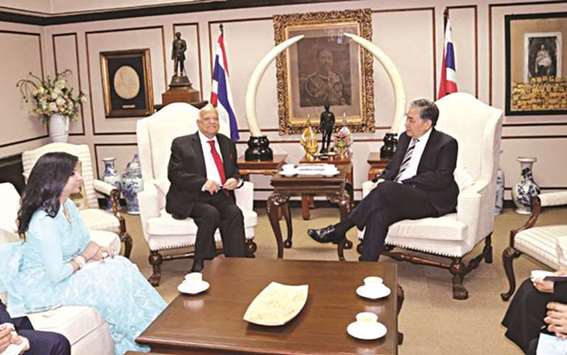Abdul Muhith discussed the issue with his Thai counterpart Apisak Tantivorawong during a meeting in Bangkok on Thursday, the Bangladesh foreign ministry in Dhaka said yesterday.
He briefed the Thai finance minister on the unprecedented humanitarian crisis and economic burden being shouldered by Bangladesh following the mass influx of nearly 700,000 Rohingya into Bangladesh since August 2017.
He thanked Thailand for its supportive position on the OIC resolution on Myanmar at the UNGA in November 2017, and sought support to convince Asean countries for a peaceful resolution to the Rohingya crisis.
The finance minister is on a two day-visit to the Southeast Asian nation. He discussed issues of mutual interest and bilateral economic co-operation there.
Bangladesh ambassador to Thailand Saida Muna Tasneem and senior officials of the Bangladesh embassy and Thai finance ministry were also present at the meeting.
Both the ministers expressed satisfaction at the recently concluded high-level meetings between the countries including the foreign minister-level seventh joint commission, the fourth joint trade committee at the commerce ministers’ level and the first foreign office consultations between the two foreign secretaries.
Referring to the bilateral trade volumes to the tune of $1bn, Muhith reiterated Bangladesh’s request to Thailand for duty and quota-free market access of 36 products from Bangladesh at the earliest.
He also appreciated Thai investments to the tune of $1.5bn in Bangladesh and sought greater FDI in the food processing and tourism.
He also discussed how both countries can share best practices in achieving higher growth.
UN condemns food
insecurity: The UN World Food Programme (WFP) yesterday condemned the food insecurity faced by the 655,500 Rohingya refugees who fled to Bangladesh from Myanmar since an outbreak of violence in August last year.
“Although more than 90% of Rohingya refugees in Cox’s Bazar (a district in southeastern Bangladesh where the refugee camps are located) have received emergency food assistance, a major concern is limited access to a well-diversified and balanced diet,” the WFP said in a statement.
A study carried out by the agency between November and December, titled “Rohingya Emergency Vulnerability Assessment”, revealed that 80% of the overall refugee population was either highly or entirely reliant on life-saving assistance, Efe news reported.
“WFP’s food distributions to the new arrivals is rice, vegetable oil and lentils - an emergency ration designed to provide basic calories, but lacking in dietary diversity,” the WFP said.
It recommended the expansion of its e-voucher programmes, under which the refugees receive a monthly ration on a pre-paid debit card which can be used in allocated shops to buy different foods.
Some 90,000 people are currently enrolled in WFP’s e-voucher programmes.
According to the UN Inter-Sector Co-ordination Group, some 655,000 Rohingya refugees have arrived in Bangladesh since August 25, 2017.
The exodus was triggered by the Myanmar security forces launching an operation in retaliation to an attack by the Arakan Rohingya Salvation Army (ARSA) on several security posts in Rakhine state.
The governments of Bangladesh and Myanmar earlier reached an agreement on the process of repatriation for the Rohingya refugees who fled to Bangladesh, which is expected to begin in the coming months.
Several human rights organisations, however, have repeatedly denounced that conditions were not appropriate for the safe return of the Rohingyas to Myanmar, where, according to recently-arrived refugees, the military campaign against them was still ongoing.
The UN and human rights organisations pointed out clear evidence that abuses were committed, while the UN High Commissioner for Human Rights Zeid Ra’ad Al Hussein described the situation as “genocide”.

